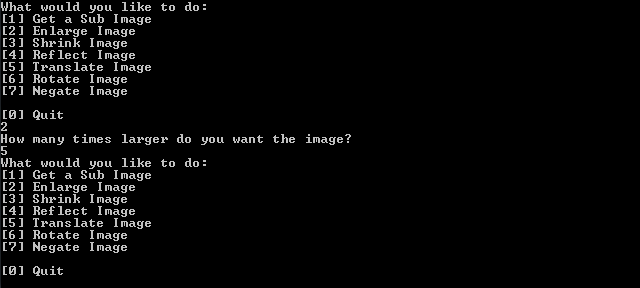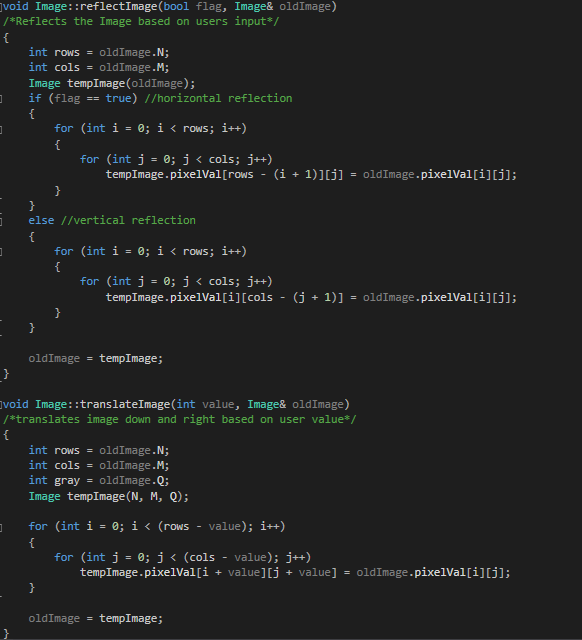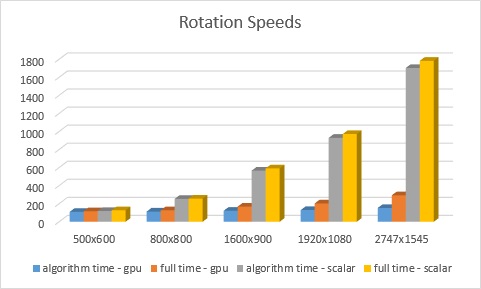Difference between revisions of "GPU610/TeamKappa"
(→Assignment 2) |
(→Assignment 2) |
||
| Line 175: | Line 175: | ||
== Assignment 2 == | == Assignment 2 == | ||
| + | |||
| + | For assignment 2, we have elected to parallelize the image manipulation program that Ryan Mullings looked at for the first assignment. This program preforms algorithms on black and white *.pgm image files. | ||
| + | |||
| + | * [http://www.dreamincode.net/forums/topic/76816-image-processing-tutorial/ original source code] | ||
| + | * [https://convertio.co/ convert files to *.pgm] | ||
| + | * [http://www.gimp.org/ gimp - a program to view *.pgm files] | ||
=== Image Manipulation: Rotation === | === Image Manipulation: Rotation === | ||
| + | |||
| + | For all benchmarks, the image was rotated 45 degrees counter clockwise. The following is the example input and output from running one of the tests: | ||
| + | |||
| + | C:\Users\Matt\Documents\Visual Studio 2013\Projects\A2\rotate>GPU 1600_900.pgm 1600_900_gpu.pgm | ||
| + | What would you like to do: | ||
| + | [1] Get a Sub Image | ||
| + | [2] Enlarge Image | ||
| + | [3] Shrink Image | ||
| + | [4] Reflect Image | ||
| + | [5] Translate Image | ||
| + | [6] Rotate Image | ||
| + | [7] Negate Image | ||
| + | |||
| + | [0] Quit | ||
| + | 6 | ||
| + | Enter to what degree you want to rotate the image: | ||
| + | 45 | ||
| + | method: rotate - cuda (122) | ||
| + | method: rotate - full (168) | ||
| + | What would you like to do: | ||
| + | [1] Get a Sub Image | ||
| + | [2] Enlarge Image | ||
| + | [3] Shrink Image | ||
| + | [4] Reflect Image | ||
| + | [5] Translate Image | ||
| + | [6] Rotate Image | ||
| + | [7] Negate Image | ||
| + | |||
| + | [0] Quit | ||
| + | 0 | ||
| + | You have chosen to close the progam. | ||
| + | Press any key to continue . . . | ||
| + | |||
| + | All benchmarks were run with the following system specs: | ||
| + | |||
| + | * AMD FX-8150 Eight-Core 3.6 GHz | ||
| + | * Cuda 7.5 | ||
| + | * NVIDIA GeForce GTX 670 | ||
==== Benchmark ==== | ==== Benchmark ==== | ||
| Line 253: | Line 297: | ||
==== GPU Code ==== | ==== GPU Code ==== | ||
| + | |||
| + | const unsigned ntpb = 1024; | ||
__global__ void kernel_rotate(int * old_image, int * temp_image, float rads, int rows, int cols) { | __global__ void kernel_rotate(int * old_image, int * temp_image, float rads, int rows, int cols) { | ||
Revision as of 16:21, 7 November 2015
GPU610/DPS915 | Student List | Group and Project Index | Student Resources | Glossary
Team Kappa
Team Members
- Ryan Mullings, Team Member
- Andy Cooc, Team Member
- Matt Jang, Team Member
Assignment 1
Program 1: RSA Encryption
Code From Github: link
Profiling
- gprof: Encryption 10MB
% cumulative self self total time seconds seconds calls s/call s/call name 60.48 1.50 1.50 3495254 0.00 0.00 fastModularExp(unsigned long long, unsigned long long, unsigned long long) 32.66 2.31 0.81 3495254 0.00 0.00 findHighestSetBit(unsigned long long) 4.44 2.42 0.11 1 0.11 2.48 encryption(std::string, std::string, std::string) 2.42 2.48 0.06 3495254 0.00 0.00 intToByteArray(int, char*) 0.00 2.48 0.00 1 0.00 0.00 _GLOBAL__sub_I__Z10encryptionSsSsSs 0.00 2.48 0.00 1 0.00 0.00 _GLOBAL__sub_I_main 0.00 2.48 0.00 1 0.00 0.00 __static_initialization_and_destruction_0(int, int) 0.00 2.48 0.00 1 0.00 0.00 __static_initialization_and_destruction_0(int, int)
- gprof: Encryption 20MB
% cumulative self self total time seconds seconds calls s/call s/call name 63.65 3.27 3.27 6990507 0.00 0.00 fastModularExp(unsigned long long, unsigned long long, unsigned long long) 29.04 4.75 1.49 6990507 0.00 0.00 findHighestSetBit(unsigned long long) 3.90 4.96 0.20 1 0.20 5.13 encryption(std::string, std::string, std::string) 3.41 5.13 0.17 6990507 0.00 0.00 intToByteArray(int, char*) 0.00 5.13 0.00 1 0.00 0.00 _GLOBAL__sub_I__Z10encryptionSsSsSs 0.00 5.13 0.00 1 0.00 0.00 _GLOBAL__sub_I_main 0.00 5.13 0.00 1 0.00 0.00 __static_initialization_and_destruction_0(int, int) 0.00 5.13 0.00 1 0.00 0.00 __static_initialization_and_destruction_0(int, int)
- gprof: Encryption 30MB
% cumulative self self total time seconds seconds calls s/call s/call name 68.04 5.11 5.11 10485760 0.00 0.00 fastModularExp(unsigned long long, unsigned long long, unsigned long long) 25.23 7.00 1.90 10485760 0.00 0.00 findHighestSetBit(unsigned long long) 3.99 7.30 0.30 1 0.30 7.51 encryption(std::string, std::string, std::string) 2.73 7.51 0.20 10485760 0.00 0.00 intToByteArray(int, char*) 0.00 7.51 0.00 1 0.00 0.00 _GLOBAL__sub_I__Z10encryptionSsSsSs 0.00 7.51 0.00 1 0.00 0.00 _GLOBAL__sub_I_main 0.00 7.51 0.00 1 0.00 0.00 __static_initialization_and_destruction_0(int, int) 0.00 7.51 0.00 1 0.00 0.00 __static_initialization_and_destruction_0(int, int)
- gprof: Decryption 10MB
% cumulative self self total time seconds seconds calls s/call s/call name 69.80 1.71 1.71 3495254 0.00 0.00 fastModularExp(unsigned long long, unsigned long long, unsigned long long) 21.63 2.24 0.53 3495254 0.00 0.00 findHighestSetBit(unsigned long long) 6.12 2.39 0.15 1 0.15 2.45 decryption(std::string, std::string, std::string) 2.45 2.45 0.06 3495254 0.00 0.00 intToByteArray(int, char*) 0.00 2.45 0.00 1 0.00 0.00 _GLOBAL__sub_I__Z10encryptionSsSsSs 0.00 2.45 0.00 1 0.00 0.00 _GLOBAL__sub_I_main 0.00 2.45 0.00 1 0.00 0.00 __static_initialization_and_destruction_0(int, int) 0.00 2.45 0.00 1 0.00 0.00 __static_initialization_and_destruction_0(int, int)
- gprof: Decryption 20MB
% cumulative self self total time seconds seconds calls s/call s/call name 64.11 3.38 3.38 6990507 0.00 0.00 fastModularExp(unsigned long long, unsigned long long, unsigned long long) 27.18 4.82 1.44 6990507 0.00 0.00 findHighestSetBit(unsigned long long) 4.73 5.07 0.25 1 0.25 5.28 decryption(std::string, std::string, std::string) 3.98 5.28 0.21 6990507 0.00 0.00 intToByteArray(int, char*) 0.00 5.28 0.00 1 0.00 0.00 _GLOBAL__sub_I__Z10encryptionSsSsSs 0.00 5.28 0.00 1 0.00 0.00 _GLOBAL__sub_I_main 0.00 5.28 0.00 1 0.00 0.00 __static_initialization_and_destruction_0(int, int) 0.00 5.28 0.00 1 0.00 0.00 __static_initialization_and_destruction_0(int, int)
- gprof: Decryption 30MB
% cumulative self self total time seconds seconds calls s/call s/call name 66.88 5.25 5.25 10485760 0.00 0.00 fastModularExp(unsigned long long, unsigned long long, unsigned long long) 24.59 7.18 1.93 10485760 0.00 0.00 findHighestSetBit(unsigned long long) 5.73 7.63 0.45 1 0.45 7.85 decryption(std::string, std::string, std::string) 2.80 7.85 0.22 10485760 0.00 0.00 intToByteArray(int, char*) 0.00 7.85 0.00 1 0.00 0.00 _GLOBAL__sub_I__Z10encryptionSsSsSs 0.00 7.85 0.00 1 0.00 0.00 _GLOBAL__sub_I_main 0.00 7.85 0.00 1 0.00 0.00 __static_initialization_and_destruction_0(int, int) 0.00 7.85 0.00 1 0.00 0.00 __static_initialization_and_destruction_0(int, int)
Bottleneck Code
The two slowest parts of this encryption method are fastModularExp and findHighestSetBit. A third function, intToByteArray, takes up a relatively small amount of time but may still be able to be optimized.
unsigned int fastModularExp(ULong a, ULong b, ULong c) {
ULong result = 1;
ULong leadingbit = findHighestSetBit(b); // Heighest set bit
while(leadingbit > 0){ //while there are bits left
result = ((result*result) % c); //case 1: bit is a 0
if((b & leadingbit) > 0){
result = ((result * a) % c); //case 2: if bit is a 1
}
leadingbit = leadingbit >> 1;
}
return (unsigned int)result;
}
ULong findHighestSetBit(ULong num){
ULong result = 0;
for(int i = 63; i >= 0; i--){
if(num & (1ULL << i)){
result = 1ULL << i;
return result;
}
}
return result;
}
byte* intToByteArray(int num, byte *result){
for(int i = 0; i < 4; i++){
result[i] = (num & (0xFF << (8 *(3-i)))) >> (8 *(3-i));
}
return result;
}
At first glance, the fastest function is also the function that appears like it would be the easiest to run on a GPU. The other code does not look like it can be optimized with a GPU easily as it does not use large arrays of N size. However, after some short internet research, several documents turned up on the topic of using a GPU to make RSA faster (example: here and here). This leaves me hopeful that in the further stages of this assignment that this could be an interesting program to work with.
Ryan Mullings: Program 2-Image Manipulation Processor
I decided to profile an Image manipulation program since it had many different functions that I could play around with. Also depending on the number of files you enter as arguments the processor will display different options Source Code:link to dream in code
Sample Run
Code for some of the manipulations
Profiles
- Profile for shrinking image by 2
% cumulative self total time seconds calls s/call s/call name 40.22 5.75 2 0.00 0.00 Image(Image const&) 27.53 3.32 1 0.00 0.00 readImage(char*, Image&) 13.23 2.21 1 0.00 2.48 shrinkImage(int, Image&) 12.67 2.11 1 0.00 0.00 Image(int, int, int) 6.32 2.48 1 0.00 0.00 writeImage(char*, Image&)
- Profile for Expanding image by 3 and Rotating by 20 degrees
% cumulative self total time seconds calls s/call s/call name 64.28 11.23 1 0.00 0.00 rotateImage(Image const&) 16.89 4.51 1 0.00 0.00 enlargeImage(char*, Image&) 13.23 2.21 1 0.00 0.00 writeImage(int, Image&)
Essentially, all of the functions are the main hotspots from the test runs.
Program 3: Serial pi Calculation - C version
I've decided to profile the calculate (estimate) of pi using a "dartboard" algorithm.
work in progress...
Source Code:link title
Assignment 2
For assignment 2, we have elected to parallelize the image manipulation program that Ryan Mullings looked at for the first assignment. This program preforms algorithms on black and white *.pgm image files.
Image Manipulation: Rotation
For all benchmarks, the image was rotated 45 degrees counter clockwise. The following is the example input and output from running one of the tests:
C:\Users\Matt\Documents\Visual Studio 2013\Projects\A2\rotate>GPU 1600_900.pgm 1600_900_gpu.pgm What would you like to do: [1] Get a Sub Image [2] Enlarge Image [3] Shrink Image [4] Reflect Image [5] Translate Image [6] Rotate Image [7] Negate Image [0] Quit 6 Enter to what degree you want to rotate the image: 45 method: rotate - cuda (122) method: rotate - full (168) What would you like to do: [1] Get a Sub Image [2] Enlarge Image [3] Shrink Image [4] Reflect Image [5] Translate Image [6] Rotate Image [7] Negate Image [0] Quit 0 You have chosen to close the progam. Press any key to continue . . .
All benchmarks were run with the following system specs:
- AMD FX-8150 Eight-Core 3.6 GHz
- Cuda 7.5
- NVIDIA GeForce GTX 670
Benchmark
| image size | algorithm time - gpu | full time - gpu | algorithm time - scalar | full time - scalar |
|---|---|---|---|---|
| 500 x 600 | 109ms | 117ms | 119ms | 127ms |
| 800 x 800 | 113ms | 127ms | 254ms | 256ms |
| 1600 x 900 | 122ms | 168ms | 567ms | 592ms |
| 1920 x 1080 | 130ms | 203ms | 930ms | 972ms |
| 2747 x 1545 | 153ms | 293ms | 1704ms | 1783ms |
Scalar Code
void Image::rotateImage(int theta, Image& source) {
steady_clock::time_point first_start;
first_start = steady_clock::now();
int rows = source.N;
int cols = source.M;
Image temp(rows, cols, source.Q);
steady_clock::time_point second_start;
second_start = steady_clock::now();
float rads = (theta * 3.14159265) / 180.0;
for (int r = 0; r < rows; r++) {
for (int c = 0; c < cols; c++) {
int new_row = (int)(rows / 2 + ((r - rows / 2) * cos(rads)) - ((c - cols / 2) * sin(rads)));
int new_col = (int)(cols / 2 + ((r - rows / 2) * sin(rads)) + ((c - cols / 2) * cos(rads)));
if (inBounds(new_row, new_col)) {
temp.pixelVal[new_row][new_col] = source.pixelVal[r][c];
}
}
}
profile("rotate - cuda", steady_clock::now() - second_start);
for (int r = 0; r < rows; r++) {
for (int c = 0; c < cols; c++) {
if (temp.pixelVal[r][c] == 0) {
temp.pixelVal[r][c] = temp.pixelVal[r][c + 1];
}
}
}
source = temp;
profile("rotate - full", steady_clock::now() - first_start);
}
GPU Code
const unsigned ntpb = 1024;
__global__ void kernel_rotate(int * old_image, int * temp_image, float rads, int rows, int cols) {
int index = blockIdx.x * blockDim.x + threadIdx.x;
if (index > rows * cols) {
return;
}
int row = index % rows;
int col = index / rows;
int new_row = (int)(rows / 2 + ((row - rows / 2) * cos(rads)) - ((col - cols / 2) * sin(rads)));
int new_col = (int)(cols / 2 + ((row - rows / 2) * sin(rads)) + ((col - cols / 2) * cos(rads)));
if (!(new_row >= rows || new_row < 0 || new_col >= cols || new_col < 0)) {
temp_image[rows * new_col + new_row] = old_image[index];
}
}
void Image::rotateImage(int theta, Image & source) {
steady_clock::time_point first_start;
first_start = steady_clock::now();
int rows = source.N;
int cols = source.M;
int nb = (rows * cols + ntpb - 1) / ntpb;
int * d_temp_image;
int * d_old_image;
int * h_temp_image = new int[rows * cols];
int * h_old_image = new int[rows * cols];
for (int r = 0; r < rows; r++) {
for (int c = 0; c < cols; c++) {
h_old_image[rows * c + r] = source.pixelVal[r][c];
}
}
steady_clock::time_point second_start;
second_start = steady_clock::now();
cudaMalloc((void**)&d_old_image, rows * cols * sizeof(int));
if (!d_old_image) {
cout << "CUDA: out of memory (d_old_image)" << endl;
return;
}
cudaMalloc((void**)&d_temp_image, rows * cols * sizeof(int));
if (!d_temp_image) {
cout << "CUDA: out of memory (d_temp_image)" << endl;
return;
}
cudaMemcpy(d_old_image, h_old_image, rows * cols * sizeof(int), cudaMemcpyHostToDevice);
dim3 dGrid(nb);
dim3 dBlock(ntpb);
kernel_rotate <<<dGrid, dBlock>>>(d_old_image, d_temp_image, (theta * 3.14159265) / 180.0, rows, cols);
cudaDeviceSynchronize();
cudaMemcpy(h_temp_image, d_temp_image, rows * cols * sizeof(int), cudaMemcpyDeviceToHost);
profile("rotate - cuda", steady_clock::now() - second_start);
for (int r = 0; r < rows; r++) {
for (int c = 0; c < cols; c++) {
if (h_temp_image[rows * c + r] == 0 && c + 1 < cols)
source.pixelVal[r][c] = h_temp_image[rows * (c + 1) + r];
else
source.pixelVal[r][c] = h_temp_image[rows * c + r];
}
}
profile("rotate - full", steady_clock::now() - first_start);
}


